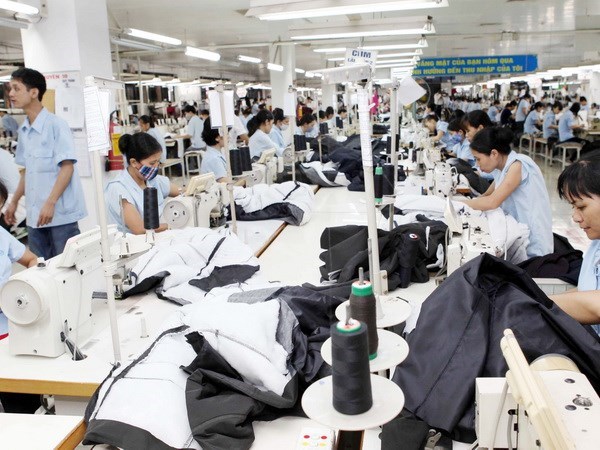
Producing garments for export at the Duc Giang Coporation (Photo: VNA)
According to the ASEAN Trade in Goods Agreement (ATIGA), Vietnam will have to cut 669 tariff lines to zero percent in January 2018.
Among the products are automobiles and spare parts, vegetable oil, refrigerators, air conditioners and dairy products.
ATIGA promises great opportunities for the country, including exports of many products the country has advantages to other members of the bloc without or very low import tariffs.
Besides, Vietnamese businesses and consumers will enjoy access to many new goods and have more choices.
As a result, the prices of products will be more competitive and their quality will be high.
ATIGA came into effect in 2010, and thanks to it and other trade agreements ASEAN has become Vietnam’s fourth biggest exporting market behind only the United States, EU and China.
The agreement aims at eliminating tariffs to foster trade among Southeast Asian nations, supporting joint efforts to handle non-tariff barriers and promoting co-operation regarding customs inside the bloc.
The Ministry of Finance said the participating countries were committed to following the roadmap:
- Brunei, Indonesia, Malaysia, the Philippines, Singapore and Thailand largely eliminated import taxes in 2010.
- Cambodia, Laos, Myanmar and Vietnam eliminated some 90 percent of their tariff lines in 2015, and 97 percent in 2018.
Vietnam already cut nearly 6,900 tariff lines, or 72 percent of all tariff lines, to zero percent in 2014. It slashed more than 1,700 other lines to zero percent in 2015.
In the first 10 months of this year Vietnam’s exports to ASEAN member countries soared 26.8 percent to 18 billion USD.
Imports from ASEAN too shot up by 19 percent in that period to 22.8 billion USD, making Vietnam the third biggest importer of ASEAN goods after the Republic of Korea and China.
The Ministry of Finance believes that the rapid increase in the imports from ASEAN will not have too big impact on the domestic market or on Government’s revenues, public investment and spending on social security.
However, market observers expect that next year when the import tariffs on automobiles go down to zero and imports jump by an expected 30-40 percent, the revenue loss to the Government will be an estimated 4.4 trillion VND a year.
Domestic manufacturers, especially of automobiles and spare parts, refrigerators, and air conditioners, and producers of vegetable oils, dairy products, as well as fruits will have to face fierce competition from imports.
Vietnamese companies will have no choice but to make better products at lower prices to win customers.
In Vietnam, many industries such as automobiles have for decades relied on Government protection and not developed high-quality brands yet.
If domestic enterprises, particularly in the auto sector, do not have proper policies in plans to cope with the changes they will lose to foreign rivals.
The first thing is for the enterprises themselves to realise the need to change to cope with the integration process.
They have to make careful preparations, including reducing production and business costs and costs of market integration to bolster the competitiveness of their products and services.
Authorities need to support them by providing sufficient information about the country’s FTA partners and analysis of the opportunities and challenges the enterprises face in each sector so that they clearly understand what they are up against.
Technical barriers based on international principles and laws can be erected for authorities to manage imports while helping Vietnamese businesses gradually improve their capacity before the complete elimination of tariff barriers.
VNA


























